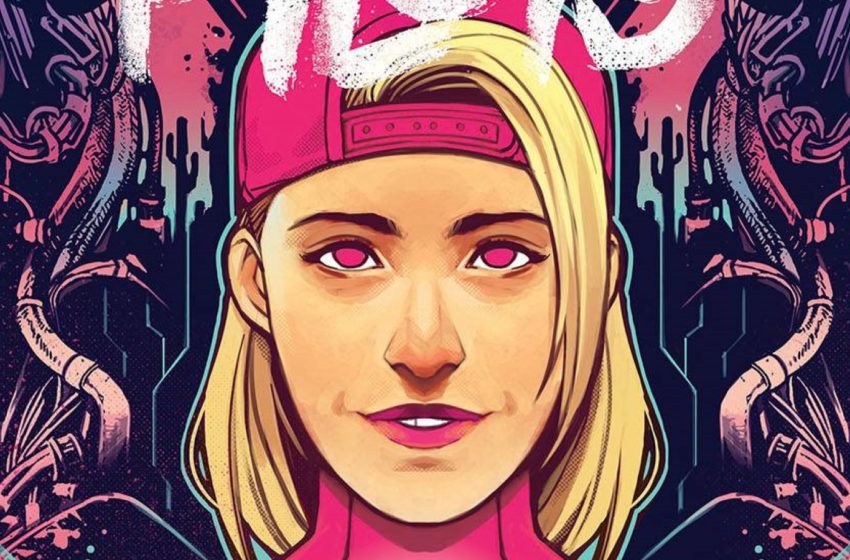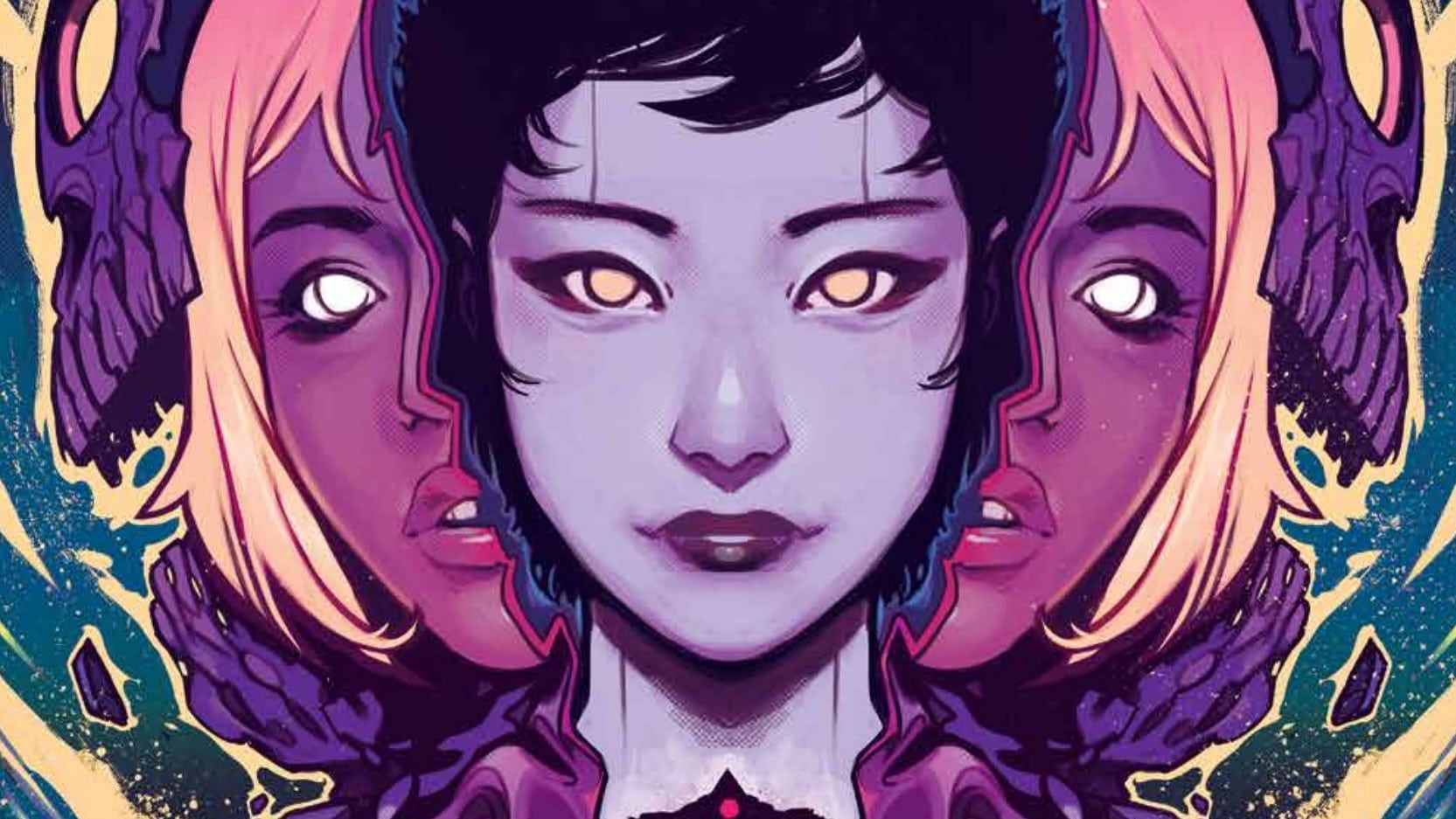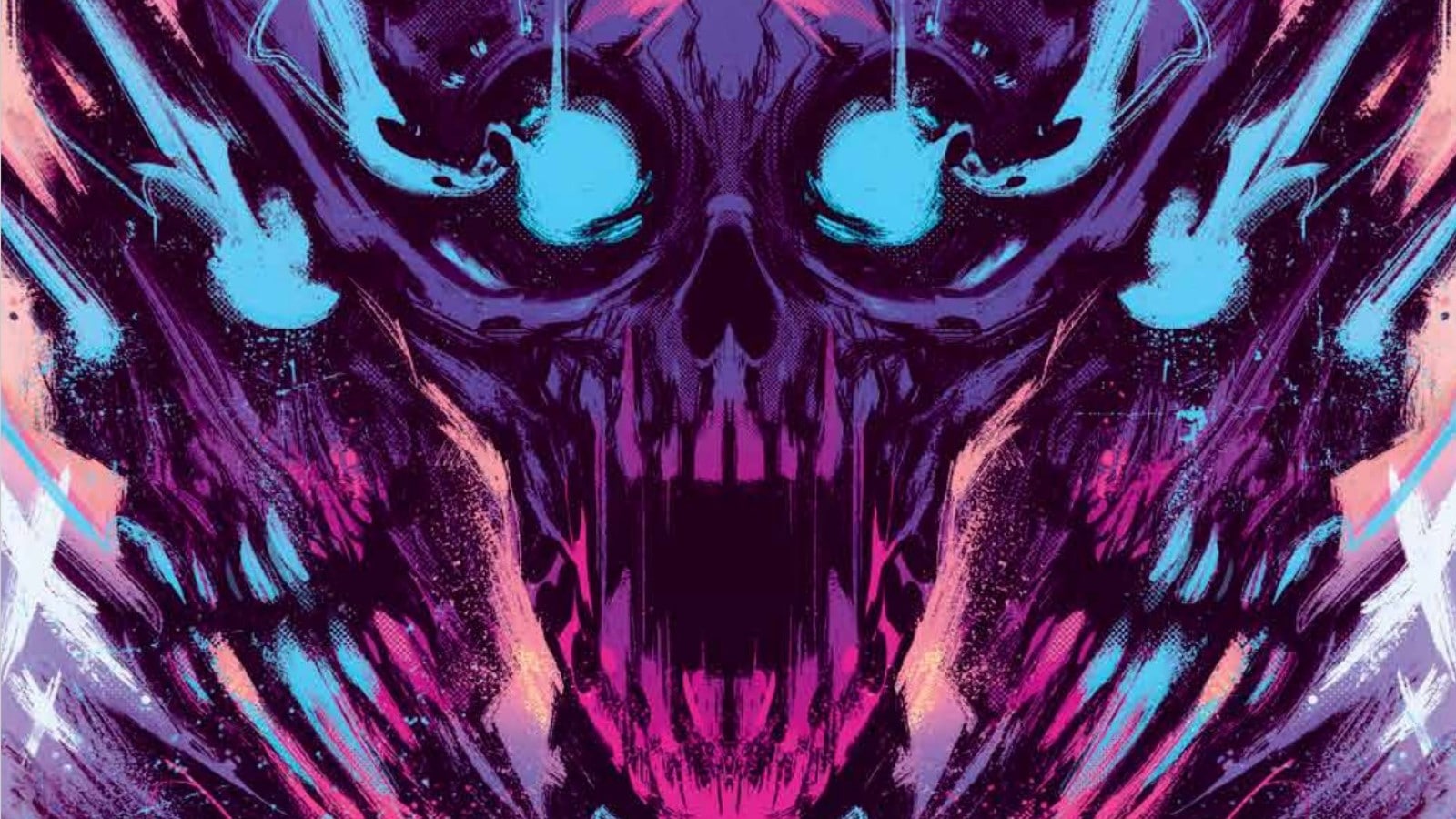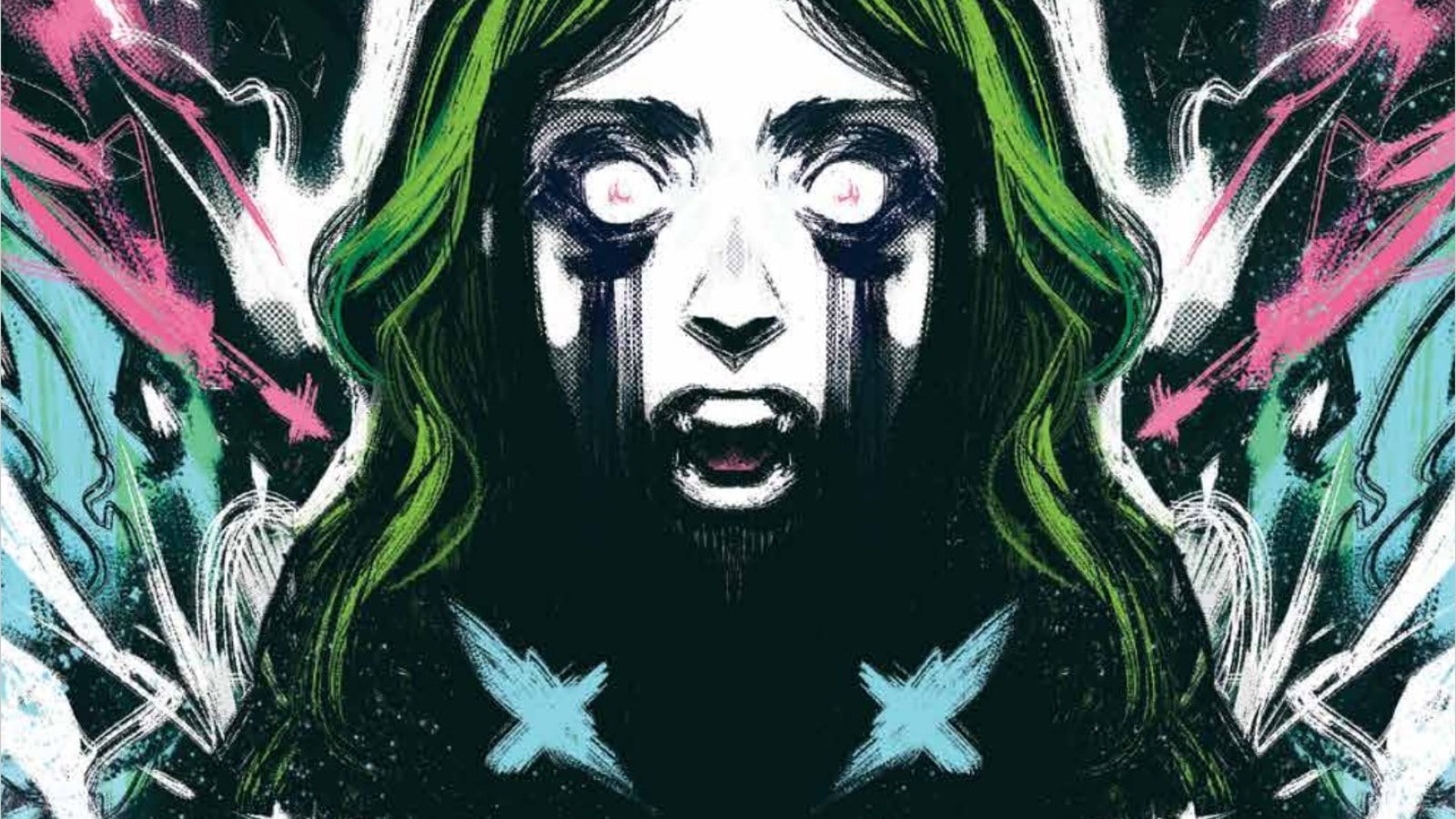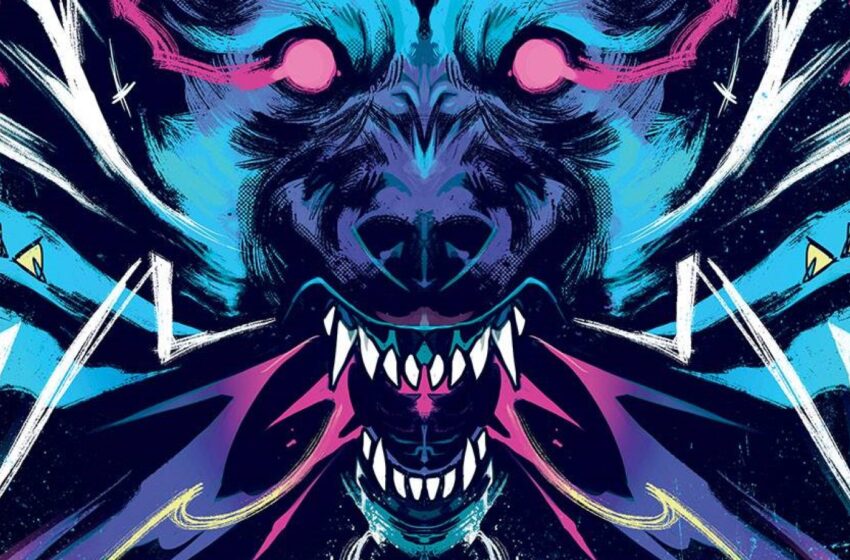Presumed dead, traveling across the country, Ami just might finally be happy. But you can’t outrun your problems forever — which is particularly a problem if your problems take the form of a one-hundred-ton haunted house. Let’s go on a road trip in Home Sick Pilots #7, written by Dan Watters, drawn by Caspar Wijngaard, lettered by Aditya Bidikar and designed by Tom Muller.
Dan Grote: Well, we called it. Ami’s not dead. She and Buzz are traveling the country by train, living that Rock Candy Mountain life and trying — failing — to stay one step ahead of the Old James House. Forrest, how does it feel to be so prescient?
Forrest Hollingsworth: Ami and Buzz are on a train to exactly where I live in real life, and I can only assume it’s to end our column’s power over their story once and for all.
Dan: Oh no, we were the real villains all along.
OJ and the Ghost Gang

Dan: In this issue, Ami finally attempts to break it off with the Old James House, in that classic setting for breakups, a gas station bathroom. Like any good (terrible) toxic ex, Old James refuses to let go in toto, claiming, “She will learn … she needs us” before disappearing. From jump, OJ — yeah, that feels right — has entrapped Ami, cut her off from her support systems and gaslit her into depression to keep her dependent on the house, so this scene was a long time coming, but …
Real talk, it would have felt more fulfilling if Ami got to do the talking in this scene, instead of Buzz. But also, this series isn’t over, and Ami reclaiming her life and agency is probably going to be a climactic moment of the whole thing. What did you think about this scene, Forrest?
Forrest: As cool and as tense as the direct confrontation with the horseshoe ghost (Neither Ami nor Buzz having any real way to contend with it) is, I do want to say that I agree with your complaint about Ami not having enough agency. Taken with the previous issue where Rip tried to “save” Meg, I think the book has a bit of a problem with centralizing men in what should ostensibly be women’s stories. That being said, it’s also a story about codependency, so I can allow it some narrative and emotional messiness, especially because I like so much of what’s happening elsewhere. I hope both Meg and Ami take the reins sooner rather than later.
The idea of the house pursuing them, afraid to leave the ocean but persistent nonetheless, is a great exploration of the idea of fear and resentment lingering — and the natural (or supernatural) process of reconciliation — too. A lot of haunted house stories hint at the reciprocal nature of residency — you haunt a house as much as its structure informs your life — but I have never seen it so explicit as this.
Dan: Indeed. And OJ is just one of the ghosts that has formed a bond with Ami. Not long after Old James disappears, the little boy ghost with his legally-distinct-from-Transformers action figure emerges from the sea to snap a Nazi’s arm (HOORAY!) and take his turn seeking out Ami.
There’s more than one way to be codependent, and it’s likely this little ghost boy sees Ami as a mother figure, someone who can protect him against … other ghosts? System Disrupt? Potter’s wheels? I don’t know, but he’s on deck.
Forrest: I was a little confused about this! A historically great way to get a reader on a character’s side is to make said character fight Nazis. Am I supposed to be anti-robot boy? I think I’m-pro robot boy. Nazi punks fuck off.
Dan: All day. All day, child.
Forrest: Incidentally, shoutout to Ami and Buzz’s freighthopping. Train cops fuck off, too.
Dan: Lousy train cops, always out for my bindlesticks.
Buzz & Ami

Dan: Ami’s relationship with the ghosts is contrasted against her relationship with Buzz, who’s decided to be her ride-or-die on this house-evading journey. He clearly cares for her and wants to protect her — maybe even LOVES her? — but is that the BEST thing for him to be doing? Ami says it herself, he’s abandoned his family for her. Is Ami bad for Buzz in the same way the Old James House is bad for Ami?
Forrest: So first off, I have to say that I really loved this scene. Wijngaard breaks the usual color palette of the series — dark blues, blacks and reds — to create a more nuanced, subtle feeling as the sun sets on Ami and Buzz, a warm yellow-pink twilight. There’s a sense of visual clarity that complements Ami’s emotional clarity, a sharp contrast to the oppressive, dark tones that feels both novel and important to the story: a vision of something different.
I also think Watters’ intent is to explore that idea. Yes, Ami and Buzz are hewing really close to a potentially toxic, codependent relationship that might hurt both of them in the long run, but there’s also the sense that by acknowledging that, they can subvert the patterns that have been prevailing throughout the first arc.
Dan: Here’s hoping! Now for the real question: Do we need an Ami-Buzz romance plot? I submit that we do not, that the case for their bond is stronger as a platonic love. BUT, I understand that grief creates strange bedfellows, especially among teenagers who aren’t yet equipped to process it, so maybe it’s fine and I’m just old.
Forrest: They’re kids, right? I tend to think the idea is that they’re feeling everything all of the time, heightened by the direness of their situation, rather than just one concrete thing — an inherent messiness that allows the narrative to stay flexible, and to allow the characters to be both relatable and difficult all at once. In keeping with our discussion above, though, if their arc becomes the center rather than Ami’s own, I might be a little disappointed.
The Meg of It All

Dan: Meanwhile, back in Nevada, Meg seems to have pulled an about face and accepted her role as pilot of the Nuclear Bastard and defeating the James House as the only way to save her old bandmates. Sounds noble, but it also sounds like another Ami-James House relationship in the making. Which sucks, because as we’ve said since the beginning, Meg seems like the sensible one. Forrest, what do we gotta do to save our girl?
Forrest: Meg’s rejection of Rip was interesting! I wonder if the salt pills left her feeling like she can harness the power of the Bastard for her own uses? If she’s got a robot, she doesn’t need us, Dan.
Dan: She never needed us, Forrest. She’s better than us. She’s Meg. If anyone can break the cycles of codependence we saw this issue, it’s her.
Cool Miscellany, Bro
- I love how the band names on the posters in the legally-distinct-from-7eleven all speak to the plot of the book in some way.
- I hate that Nazis are another kind of punk. I miss my culturally appropriative street punks from the first arc.

